- Home
- John Bellairs
The Treasure of Alpheus Winterborn
The Treasure of Alpheus Winterborn Read online
The Treasure of Alpheus Winterborn
John Bellairs
Copyright © 1978 by John Bellairs
Published by E-Reads. All rights reserved.
www.ereads.com
For KEETAH,
who liked it when others didn’t
CHAPTER 1
It was a windy night in March. Anthony Monday lay in his bed listening to his heart beat. He was lying on his left side, and the muffled thudding sounded as if it were coming from down inside the mattress. Anthony was scared, but not of the dark. He was scared of what he was listening to. Downstairs, his mother and father were arguing. As usual, they were arguing about money.
“I don’t care what you say, Howard. There just isn’t enough money coming in, and that’s all there is to it. The bills just keep piling up, and I ask myself, ‘How are we going to pay them?’ How are we going to, Howard? You tell me how!”
“Oh, come on, Ginny. It’s not as bad as all that. Why—”
“Not so bad, is it! Not so bad! Well, let me tell you...”
And on it went. Mrs. Monday had a thing about money. There was never enough of it around to suit her. She worried so much about money because when she was a little girl, a terrible thing happened to her family. Her father had invested in some stocks that turned out to be fakes, and he lost nearly everything he had. Mrs. Monday had grown up poor, and now she couldn’t convince herself that she was well off. The memory of her father’s financial disaster haunted her and made her fret and stew about money when there was no reason to worry at all.
Listening to his parents argue made Anthony feel sick to his stomach. He lay there, eyes wide, staring at the dark wall next to his bed. He heard his mother say that if they didn’t watch out, they’d all be out in the street. In his mind’s eye, Anthony saw his mother and himself standing in the street outside the blackened ruins of their house—this vision always came to him whenever his mother talked that way. It hovered before his eyes like a picture on a movie screen. He wondered if his family really would go broke someday. He worried a lot about money, and considering what his mother was like, this was not very surprising.
Finally, the argument was over. Anthony heard his mother’s chair scrape back as she got up and started fixing Mr. Monday’s supper. It was almost midnight. Mr. Monday worked late six nights a week. He ran a saloon. In the town where the Mondays lived, nice people didn’t run saloons, and the Mondays tried hard to be nice people, so they called their saloon a cigar store: Monday’s Cigar Store. And there actually were some dusty glass cases up in the front of the store that had cigars in them. Mostly, though, Monday’s Cigar Store sold beer and wine by the glass. Running the place was hard work, and Mr. Monday ran his saloon all by himself. He had hired a helper once, but Mrs. Monday had accused the helper of stealing money out of the cash register, so Mr. Monday had let him go. Anthony often wished he were old enough to help his dad out, but state law said you had to be eighteen to work in a place where liquor was sold, and that was that. Anthony’s brother, Keith, who was sixteen, would be able to help their father in two more years. But for now, Mr. Monday had to go it alone.
It was silent downstairs now, except for the sound of bacon sizzling. Anthony rolled over and tried to sleep. Wild shadows, cast by the swinging street lamp on the corner, leaped across the bedroom wall. From across the hall, Anthony could hear the sound of his brother’s snoring. Keith was lucky. He could sleep through anything. Meanwhile, Anthony lay awake, worrying. He worried about what would happen if his dad got so sick that he couldn’t work. There wasn’t much work that a thirteen-year-old boy could do. He could get a paper route, but you hardly made anything at all doing that....
The shelf clock downstairs struck half past twelve. Anthony started to feel drowsy, and as always, his mind drifted from worry into daydream. First he was a diver, stumping across the floor of the ocean in a diving suit, poking among the rotting ribs of a Spanish galleon till he found a chest full of gold coins. Then he imagined himself sitting at his own kitchen table downstairs. The table was covered with a heap of gold coins. Behind him stood his parents. They were smiling as they looked at the glittering mound of wealth. Now his mother would never have to worry about money again, not ever....
And with this pleasant image before his eyes, Anthony fell asleep.
The next day after school, Anthony decided to stop by the library on his way home. He did this a lot, not so much because he was a bookworm, but because he liked the librarian, Miss Eells. Miss Myra Eells was the librarian at the public library in the town of Hoosac, Minnesota, where Anthony lived. Anthony had met her one day when the two of them were browsing at the same magazine rack in a drugstore. They had gotten into a conversation, and after that they had gotten to be friends. Anthony liked Miss Eells. In many ways, she was closer to him than his own mother was. For one thing, he wasn’t scared of Miss Eells. He felt comfortable with her. It wasn’t the same way with his mother. She always seemed to be bawling him out or telling him that he was worthless and stupid and selfish.
But with Miss Eells it was different. She took Anthony seriously. She listened to him. She took time off from her work to just sit around and be with him, and that meant a lot to Anthony. Miss Eells did other things for him, too. She bought Anthony presents and took him for rides in her car. She had taught him how to play chess, and she had taught him a code that had been used by spies during the Civil War. Anthony and Miss Eells left each other messages in this code because it was fun to do. Sometimes Anthony wondered why she was so nice to him. Anthony didn’t have a lot of friends, and he didn’t think much of himself—that is, he didn’t think he was a very wonderful person—so it was only natural that he would wonder why Miss Eells wanted to be friends with him. Anthony’s mother was always telling him to watch out for people who were nice to you because they were only trying to butter you up so they could take advantage. Luckily for Anthony, he didn’t always follow his mother’s advice. He took Miss Eells’s love for what it was and was happy with it.
Whistling cheerfully, Anthony trotted down Minnesota Avenue, the main street of town, and crossed Levee Park. It was a chilly March day, and Anthony was wearing his brown leather jacket and his red leather cap. He had always worn red leather caps, ever since he could remember, and he had always scrunched the peaks on them so they were curved. He was funny about things like that.
When he got to the far side of the park, he stopped and looked up at the library, a dark shape looming over the bare trees. He always stopped and stared at the library before he went into it. Even people who walked along with their noses to the ground would often look up when they passed it. It was really something to stare at.
The Hoosac Public Library was like a castle out of a fairy tale. Of course, it was a bit smaller than most castles, being only two stories high. But it had battlements like a castle, and funny little bulges here and there with narrow loophole windows, the kind that soldiers might shoot through when they saw the enemy coming. At one corner was a tall round tower with a slate roof and a weather vane with a reindeer on it. Like a castle, the building was made of stone, black stone that glistened when it was wet, and it was covered with fantastic carvings. The carvings nestled in all the angles and corners of the building. They showed stone dwarfs hammering on stone anvils, stone scholars reading stone books, stone dragons breathing curls of stone steam, and many other strange things. Over the main doorway of the library was a carving that showed a half-moon. The moon was the kind that you see in Mother Goose books, with a face and a big, long nose:
Under the moon face was a stone banner, and on it these words were carved: BELIEVE ONLY HALF OF WHAT YOU READ.
It
was a funny kind of inscription to put over the door of a library. But then, the Hoosac Public Library had been built by a funny kind of man.
The Hoosac Public Library had been designed, built, and paid for back in 1929 by a man named Alpheus T. Winterborn. Mr. Winterborn had been rich—very rich. He had made his money from a company that still employed about half the people in Hoosac—the Winterborn Silverware Company. Winterborn Silverware made silver-plated objects of all kinds—knives, forks, spoons, teapots, percolators, tea strainers and tea balls, and Edam cheese holders—things like that. The company also cast statues in bronze and other metals. In fact, it had cast the small bronze reindeer on the weather vane atop the tower of the library. The company had gotten to be famous nationwide, like the 1847 Rogers Brothers, and it had made Alpheus Winterborn a millionaire.
Millionaires often spend their money in strange ways, but none of them ever spent his more strangely than Alpheus Winterborn did. In the last twenty years of his life, he went from one fad to another. First he decided that he was going to be an inventor. He tried to invent a perpetual-motion machine, a gadget that would run all by itself, without steam or electricity or gasoline or any kind of fuel. He tinkered for years, but all he ever came up with were some funny-looking gadgets that would run for two or three hours and stop. But Alpheus Winterborn wasn’t discouraged. He had a lot of money and a lot of time. Next he decided that he would be an archeologist. This was in 1922, when the whole world was talking about King Tut’s tomb, which had just been discovered. Alpheus Winterborn didn’t see why he couldn’t discover something, too, so he bought a pith helmet, a pick, a shovel, and a lot of other gear and went to Egypt. He dug at Luxor, at Karnak, and at some other places on the Upper Nile. Then he went to the Holy Land and did some digging there. When he came back to Hoosac after being away for almost two years, rumors started to fly around. People claimed that old Alpheus had discovered something strange and wonderful, something really valuable. No one knew for sure what the thing was or who it was who had started the rumors, but there were many people in the town of Hoosac who would swear on a stack of Bibles that Alpheus Winterborn had made a find.
Whatever this mysterious treasure was, nobody ever saw it. Alpheus Winterborn remained his usual stolid, uncommunicative self, and after a few months in Hoosac he was off to the Near East again. He made three trips in all to Egypt and Palestine, and every time he returned home, the mysterious rumors started up again. But there are always people in every town who will start rumors, and generally the rumors have no foundation at all.
After his last trip, Alpheus Winterborn came back to Hoosac and shut himself up in his house. He saw no one and talked to no one. He had always been an odd person and the subject of much gossip in the town of Hoosac. But he was odder now than he had ever been, and people began to wonder if maybe they would wake up some morning and find that he had hanged himself from the chandelier in his living room.
Just when public curiosity reached a fever pitch, Alpheus Winterborn came out of hiding. He was nearly seventy, but there was life in the old boy yet. He announced that he would become an architect. What he designed was the Hoosac Public Library. He built it as a kind of shrine to his own memory, just as the Pharaohs of ancient Egypt built their pyramids to house their bodies, their souls, and the record of their accomplishments. On the second floor of the building there was to be an Alpheus Winterborn Reading Room. It was to contain, among other things, a long, windy account, written by himself, of his archeological diggings. No one could figure out why he wanted to leave behind a record of his career as an archeologist, since he had never found anything worth mentioning—except for the mysterious treasure that everyone talked about. But he was a strange man. And because he was rich, he could pretty much do what he pleased.
For the last two years of his life, Alpheus Winterborn was all wrapped up in the library he was building. Day after day he went down to watch the men who were working on it. He would pace back and forth with a roll of blueprints in his hand, carping and making suggestions till the workmen were sick of the sight of him. Finally, though, it was finished in the late fall of 1929. And then Alpheus Winterborn did the strangest thing. The library was to have opened on the first of November, but Alpheus Winterborn ordered that the opening be delayed for a week. Why? Because he wanted to live in the library. To live, as he put it, “inside my own creation,” for just seven days.
It was certainly a strange request, but since Alpheus Winterborn was putting up the money for the library, everybody had to do what he wanted. So for a solid week, old Alpheus Winterborn lived in the newly finished Hoosac Library. During that time he never went out. The shades and the drapes on all the windows were pulled tight, but people who passed the library that week thought they could catch glimpses of him going to and fro with a lighted candle in his hand. At the end of the week, he came out and told the mayor and the city council that they could have their grand opening at last. Two weeks later, Alpheus Winterborn was dead.
Anthony stood staring at the library and thinking of all the wild stories he had heard about Alpheus T. Winterborn. He wondered if his mysterious treasure really did exist, and if it did—where? Then he snapped out of his trance and started walking again, and as he walked, he whistled a popular tune that was on the radio a lot. He stopped whistling as soon as he opened the front door of the library because, as he very well knew, you were supposed to be quiet in libraries. He looked around for Miss Eells. Where was she? She wasn’t at the main desk, so maybe she was in her office. No, she wasn’t there, either. Finally he found her in the West Reading Room. She was standing at the top of a stepladder with a long-handled feather duster in her hand. As she swept the duster back and forth across the faded spines of books, clouds of dust filled the room. Anthony started to call to her, but before he could get anything out, he began to sneeze. Miss Eells stopped dusting and turned around.
Miss Eells was a small, birdlike woman with a wild nest of white hair on her head. Everything about Miss Eells was birdlike. Her eyes, behind her gold-rimmed glasses, were small and bright, like the eyes of a bird, and the quick, darting, side-to-side motions of her head were birdlike, too. The bones of her hands were small and delicate, like the bones of a bird. Her voice was quiet and precise, but oddly enough she had a large vocabulary of curse words. She used these words only on special occasions. Anthony especially remembered the time an entire box of Ohio kitchen matches burst into flame in her hand when she was lighting a fire in one of the library fireplaces at Christmastime. He had been the only one in the library with her, and he still remembered how strange it had been to hear her pour forth a stream of profanity in that well-modulated, ladylike voice of hers.
“Well, hello, Anthony! What brings you to the... aah... the aaaaaAAAAACHOOOO!” Miss Eells sneezed loudly. Anthony sneezed again, too, and then both of them laughed. “I had better open a few windows,” she said as she climbed down from the step- ladder. “Otherwise we’ll both die of the convulsions.”
Anthony followed Miss Eells around the room as she opened the tall windows with transoms at the top. To open the transoms she used a long pole with a hook on the end. Anthony liked to watch her do this. Then Miss Eells went to her office and started making tea.
It took her some time. As Anthony had noticed before, Miss Eells had trouble doing some things, in spite of her brisk, businesslike air. While he sat waiting patiently, she knocked the hot plate halfway off its little table when she tried to turn it on. Finally she got the switch to obey her, and the coil of wire began to glow red. As soon as she had the hot plate set straight on the table, she took a step backward and knocked the teakettle off the corner of her desk. With a sigh, she stooped, picked up the kettle, and carried it into her private bathroom to fill it. Anthony heard the kettle drop into the sink a couple of times, and he heard Miss Eells saying something under her breath.
Now the kettle was warming up on the hot plate. Miss Eells opened a small built-in cupboard in the wall behind her
desk and took out two cups, two saucers, and the sugar bowl. She tried to hold them all at once, and she just barely managed to get them all to the desk without dropping them. Then she knocked over the sugar bowl and spent several minutes carefully sweeping the spilled sugar off the desk blotter into the little bowl. Some eraser dust and pencil shavings got mixed in with the sugar, but Miss Eells didn’t notice.
By now, Miss Eells was looking flustered and a bit disheveled. She sat down and mopped her face with her pocket handkerchief. “Well now, Anthony! And how is the world treating you these days?”
Anthony frowned. “Not so good, Miss Eells. My folks were arguing again last night. It made me feel real bad.”
Miss Eells smiled sympathetically. “Money again?”
“Yeah. My mom thinks that we don’t have enough money to live on and that we’ll all be out in the street if we don’t watch out.”
Miss Eells had to bite her tongue to keep from saying that his mother was a worrywart, but of course she couldn’t say this, not to Anthony, so she just sat and watched the kettle with a discontented look on her face. “Miss Eells?”
“Yes, Anthony? What is it?”
“Do you think the man that built this library really did hide a treasure somewheres?”
“Oh, that old story! You mean you’ve heard it, too? Well, who knows if it’s true? But I’m afraid the only treasure you and I will ever see, Anthony, is the money we make by working for it.”
Anthony said nothing. He just looked gloomy. Miss Eells went back to watching the kettle, but then, quite suddenly, she had an idea. Turning to Anthony, she said, “Do you think you’d be happier if you had a job of some kind?”
Anthony brightened up immediately. “Wow! You bet I would! Do you know about a job I could get?”
“No,” said Miss Eells. Anthony’s face fell, but she added quickly, “However, and be that as it may, I am the librarian here, and now and then I have a little extra money to play with. And too much work besides. Most people think all a librarian has to do is check out books. How would you like to be a page at this library?”

 The Curse of the Blue Figurine
The Curse of the Blue Figurine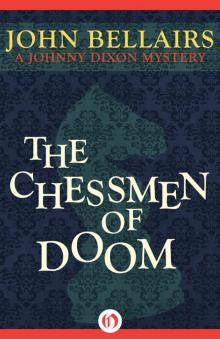 Chessmen of Doom
Chessmen of Doom Secret of the Underground Room
Secret of the Underground Room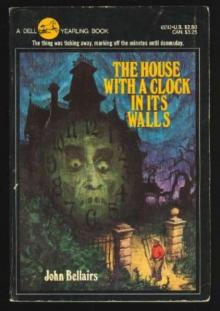 The House With a Clock in Its Walls
The House With a Clock in Its Walls The Vengeance of the Witch-Finder
The Vengeance of the Witch-Finder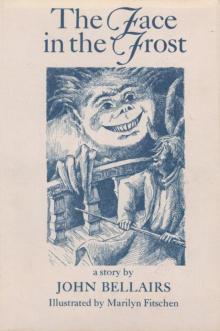 The Face in the Frost
The Face in the Frost Revenge of the Wizard's Ghost
Revenge of the Wizard's Ghost Spell of the Sorcerer's Skull
Spell of the Sorcerer's Skull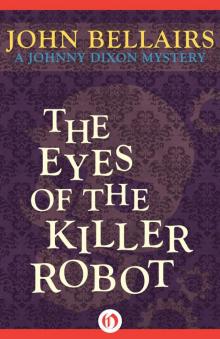 Eyes of the Killer Robot
Eyes of the Killer Robot Mummy, the Will, and the Crypt
Mummy, the Will, and the Crypt Wrath of the Grinning Ghost
Wrath of the Grinning Ghost The Mansion in the Mist
The Mansion in the Mist The Doom of the Haunted Opera
The Doom of the Haunted Opera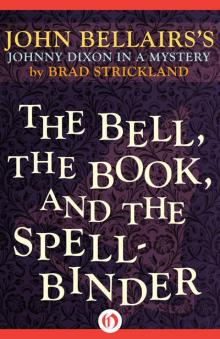 The Bell, the Book, and the Spellbinder
The Bell, the Book, and the Spellbinder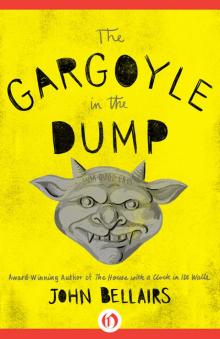 The Gargoyle in the Dump
The Gargoyle in the Dump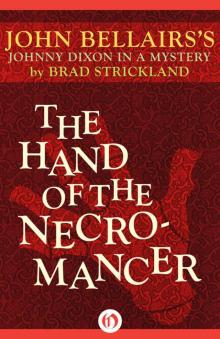 The Hand of the Necromancer
The Hand of the Necromancer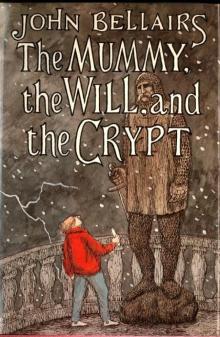 The Mummy, the Will, and the Crypt
The Mummy, the Will, and the Crypt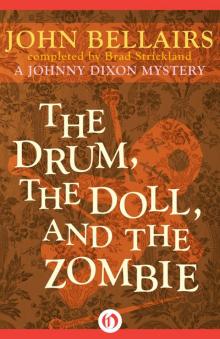 Drum, the Doll, and the Zombie
Drum, the Doll, and the Zombie The Specter from the Magician's Museum
The Specter from the Magician's Museum The Letter, the Witch, and the Ring
The Letter, the Witch, and the Ring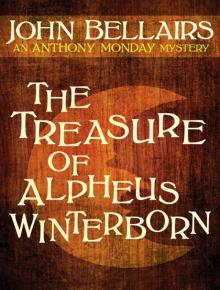 The Treasure of Alpheus Winterborn
The Treasure of Alpheus Winterborn The Dark Secret of Weatherend
The Dark Secret of Weatherend The Figure in the Shadows
The Figure in the Shadows